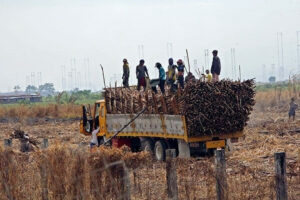THE Sugar Regulatory Administration (SRA) said it is still consulting its industry constituents, who have expressed overwhelming opposition to a proposed tax hike on sweetened packaged products.
“We are taking cognizance of these letters and we are consultating with various stakeholders on the matter,” SRA Acting Administrator Pablo Luis S. Azcona said in a Viber message.
The Philippine Sugar Millers Association, Inc. has asked President Ferdinand R. Marcos, Jr. to improve tax collection efficiency instead of imposing a higher tax on sugar-sweetened beverages (SSB).
Meanwhile, the Philippine Association of Sugar Refiners, Inc. (PASRI) has also appealed to the Department of Finance (DoF) to reconsider its plan to double excise taxes for sweetened products.
“We would like to submit our opposition to the plan to generate additional funds (for the government) by imposing higher taxes on sugar/sugar-sweetened beverages,” PASRI President Renato P. Cabati said in a July 7 letter.
Mr. Cabati said, “inefficiencies in tax collection by the government continue,” and called heightened efficiencies a potential “win-win solution.”
“Any increase in SSB tax… will — without any exaggeration — lead to the demise of our local sugar industry and affect millions of Filipinos — mostly in the rural areas — that are dependent on sugar for livelihood, income, and employment,” he said.
The PASRI said sugar consumption per capita declined to 28.98 kilograms last year from 35.99 kilograms, before the imposition of SSB tax.
The DoF and the Department of Health plan to tax “junk food” — packaged foods with limited nutritional value — and sweetened beverages to generate revenue and address diseases related to poor diet.
It is aiming to increase the SSB tax to P12 per liter for all kinds of sweetener, a tax which used to apply only to products sweetened with high-fructose corn syrup (HFCS).
The Tax Reform for Acceleration and Inclusion law of 2019 imposed a tax of P6 per liter for drinks containing caloric or non-caloric sweeteners. It taxed HFCS-sweetened drinks at P12 per liter.
The proposed tax is projected to raise up to P76 billion in revenue in the first year of implementation, according to Finance Secretary Benjamin E. Diokno.
Mr. Cabati said that despite lower sugar consumption, noncommunicable diseases remain a major problem in the Philippines.
He said that government health programs have not addressed other causal factors contributing to such diseases.
“There is no evidence that the implementation of an SSB tax has helped improve consumer access to nutritious foods, or reduced obesity and diabetes,” he said.
“Thus, increasing yet again the excise tax on beverages using sugar unfairly and erroneously singles it out as the cause and solution to a health challenge in need of multidimensional interventions,” he added. — Sheldeen Joy Talavera

